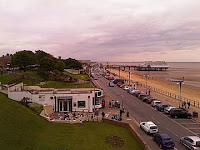It's a phrase that won't be unfamiliar today and many readers will know that it comes from Luke's Gospel. As a doctor, Luke was meticulous in his research and probably got this straight from Mary, along with some description of the journey from Nazareth to Bethlehem when heavily pregnant. It was census time and hoards of people were flocking to Bethlehem, taking up all available accommodation, and they had to make do with a stable as the place for Jesus to be born.
'Couldn't God have planned a more suitable place?' we might ask. But the Almighty knew what He was doing. After all, Jesus wasn't born a King (despite what the carol might say), but born to be King. If he was going to be accepted as their King, he had to live a human life, to know the ins and outs of the lives of His lowliest subjects. Just consider recent news bulletins for a moment. How much fuss has there been about the removal of the £20 enhancement to Universal Credit ('let them try to live on what we've got left after paying for rent and heat!') and now last year's Christmas parties during lockdown ('one law for them and one for the rest of us!')
What respect is there for a ruler who doesn't know how his people live? That's one reason we fight for proportional representation: so that we can be represented by someone who's like us, rather than an outsider 'parachuted in' to scoop up enough votes to get elected, and then isn't seen again until the next election ... but I digress.
We know why it was a stable, then. But I want to suggest symbolic understanding of that phrase, 'no room in the inn'. If we have no respect for our representatives in parliament, we have no time for them. We aren't interested in what they say, and resent any effect their actions might have on our lives. We have no room in our lives to give them consideration: 'no room in our inn', so to speak. It was the same for the people of Judea two thousand years ago.
Their land was under Roman occupation. Their lives were governed by a combination of Roman law, enforced by the Governor and his underlings, and the Jewish hierarchy led by the High Priest. Now, the priests had developed their own set of rules over the centuries, gradually corrupting the Law introduced by Moses to regulate the behaviour of the Chosen People for the benefit of all. The result was a system that favoured the ruling class at the cost of the rest.
As Jesus' ministry developed and became popular, the Pharisees (the party of the High Priest) resented the way this 'upstart son-of-a-carpenter' was undermining a society that they had moulded for their own benefit. The common people, though, loved Him because He had grown up among them; He knew the problems they faced and used His power to heal them and help them. Meanwhile, He taught them about God's love for them, showing them many ways in which the Priests (whose job that should have been) weren't doing what they were there for.
The difference between Jesus and this 'Robin Hood' characterisation that I may have portrayed here, was that He was the Son of God and, when the inevitable happened and He was killed, that wasn't the end of the story. In fact it was just the end of the prologue. Just as God's power had brought about His birth in that stable, so it also brought about His resurrection. Jesus overcame a very real and certain death and, after being seen sufficiently to give evidence of this defeat of the power of death to frighten people, He was taken back into Heaven, where he reigns still.
So, what about us, as we go about the busyness of our lives. It's Christmas ... there are decorations, presents, families to meet and greet and people to feed. There are many anxieties brought about by this wretched Covid, anxieties that almost supercede those about the 'arrangements', whether everything will go smoothly, family members get on with each other, and so on ......................
What about us?
Where does that stable fit into our lives? Do we have time to remember the babe-lying-in-a-manger all those years ago, who He was, why He came and why He was born in a stable?
Is there room in the 'Inn of our Heart' for Him?


